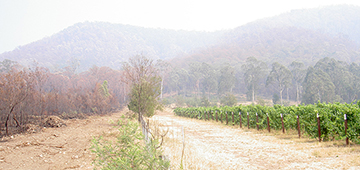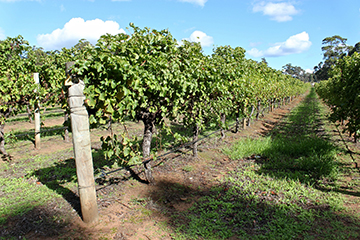Message from new Managing Director – Dr Mark Krstic
Support from state governments
SWA update – new logo and sustainability stories in the marketplace
Order the latest AWRI staff publications online
Message from new Managing Director – Dr Mark Krstic |
|
 |
Firstly, many thanks to all those that have shared their messages of support following my appointment as the new Managing Director of the AWRI. This has been an incredibly difficult growing season for our industry, with drought, bushfires, smoke taint and now the uncertainty around COVID-19. My thoughts are with all of those who have been affected, particularly those with burnt or badly smoke-affected vineyards. Since late December, the AWRI has been working closely with Wine Australia, Australian Grape & Wine, state associations, regions and individual producers to provide as much support to industry as possible. Twenty-seven industry events have been delivered, and the AWRI laboratories have received more than 3,400 samples for smoke analysis and interpretation (compared to 600 in an average year). New research trials are also underway. I’d like to extend my thanks to all AWRI staff for their continuing efforts over a long period and my best wishes to everyone in our industry that is dealing with this most challenging of vintages. Once things start to settle down, I look forward to sharing some of my ideas for the future of the AWRI with you. |
COVID-19 responseThe AWRI is monitoring the current COVID-19 pandemic closely and is taking action guided by Australian Government advice. Changes to work practices have already been implemented to help minimise the risk of spread of this virus. Further changes may be required, as the situation is changing every day. Planning is underway to ensure the AWRI can continue to provide essential services to its stakeholders while protecting the safety of staff and the broader community. Any changes to services will be communicated as quickly as possible. Please contact enquiries@awri.com.au if you need further information. |
|
Smoke taint resources |
|
 |
The AWRI has a wide range of resources for growers and winemakers on fire and smoke taint, which are all available from the smoke taint page on the AWRI website. These include links to fact sheets, webinars and articles, as well as information about analysis and interpretation. This year, new fact sheets have been added on grapevine recovery after fire, sampling grapes for smoke taint analysis, sensory impacts of smoke, managing smoke-affected vineyards and treating smoke-affected juice and wine with activated carbon. Links are also available to resources from other organisations, including Wine Australia’s fire and smoke assessment page. The AWRI helpdesk is available to answer queries about fire, smoke or any other technical viticulture or winemaking issue and can be reached via 08 8 313 6600 during business hours or via helpdesk@awri.com.au. |
Support from state governmentsThe SA, NSW and Victorian governments have all announced support for grapegrowers and winemakers affected by bushfires and smoke taint. In South Australia, affected producers are advised to call the PIRSA Recovery Hotline on 1800 931 314, to receive information about:
More information can be found at https://pir.sa.gov.au/grants_and_assistance/drought_support/family_and_business_support There is also a Rural Financial Counselling Service run by Rural Business Support. This is a free and independent professional business support for Primary Producers, accessed by calling 1800 836 211. In NSW, a rebate is available for smoke taint testing, with applications due by 20 March 2020. Details of this program can be found at: https://www.nswwine.com.au/smoke-2020/. Information on additional support services available to primary producers affected by bushfires is summarised here: https://www.dpi.nsw.gov.au/climate-and-emergencies/bushfires The NSW wine industry is also working on a technical project with Charles Sturt University and the AWRI to understand more about the measurement and impact of smoke taint compounds. This will include building a library of wines from different varieties with low, medium and high smoke test results. In Victoria, a range of support services are available. These include a rebate to support smoke taint testing, grants for technical advice and support, a sample shuttle service, grants to assist producers immediately affected by bushfires, help with bushfire clean-up and rural financial counselling. A fact sheet detailing the available services can be found here: http://agriculture.vic.gov.au/__data/assets/pdf_file/0018/511119/Factsheet-wine-industry-support.pdf |
|
SWA update – new logo and sustainability stories in the marketplace |
|
 |
A lot has been happening behind the scenes for Sustainable Winegrowing Australia over the past couple of months. The AWRI and Australian Grape & Wine are working together to develop a logo for use by certified members on wine labels and marketing materials. The logo will be a public endorsement of these members’ commitment to sustainable practices. The design is currently being finalised, and once trademarks have been applied for, it is expected that the logo will be available for use by certified members by mid-2020.
In other SWA news, Wine Australia is starting to incorporate certified members’ sustainability stories in targeted international trade and promotional activities to build awareness of Australia’s sustainable approach from vine to wine. As part of the ‘Australian Wine Made Our Way’ program, stories will be featured on the strategic topics of water, energy, waste, vineyard practices, pest & disease, people and social responsibility. These stories will also be integrated into Wine Australia’s education program and used with key influencers and wine tourism initiatives. To learn more about SWA, visit sustainablewinegrowing.com.au. |
Events updateDue to the bushfire and smoke response, a number of scheduled AWRI seminar and workshop events planned for early in the year were postponed. The events team is currently working on plans for rescheduling these events to later in the year, also taking into account the potential impact of COVID-19. Keep an eye on the AWRI events calendar for new information as it becomes available. |
|
New eBooksSix new titles have recently been added to the AWRI’s Grape and Wine eBook Collection:
To read the new titles, click on the EBSCO button found on the eBook Collection Login page. Access to the collection is reserved for Australian growers and winemakers who pay the Grape Research or Winegrape levy. Existing AWRI account holders need only sign in. If you have forgotten your password for the AWRI website, please use the forgotten password link to reset your password. New users can register for an account here. For more information on using the collection, please contact the AWRI information services team. |
|
Order the latest AWRI staff publications onlineAccessing the latest AWRI publications is easy. Visit the AWRI Publications web page to:
The AWRI’s most recent publications are listed below. 2128 Robinson, S.P., Pezhmanmehr, M., Speirs, J., McDavid, D.A.J., Hooper, L.C., Rinaldo, A.R., Bogs, J., Ebadi, A., Walker, A.R. Grape and wine flavonoid composition in transgenic grapevines with altered expression of flavonoid hydroxylase genes. Aust. J. Grape Wine Res. 25(3): 293-306; 2016. 2129 Kang, W., Muhlack, R.A., Bindon, K.A., Smith, P.A., Niimi, J., Bastian, S.E.P. Potato protein fining of phenolic compounds in red wine: A study of the kinetics and the impact of wine matrix components and physical factors. Molecules 24 (24): 4578; 2019. 2130 Miercynska-Vasilev, A., Qi, G., Bindon, K., Vasilev, K. Regeneration of magnetic nanoparticles used in the removal of pathogenesis-related proteins from white wines. Foods 9(1): 1; 2020. 2131 Simos, C., Krstic, M. I can smell smoke – now what? Aust. N.Z. Grapegrower Winemaker (672): 28-31; 2020. 2132 Hoare, T. Ask the AWRI: Reworking vineyards. Aust. N.Z. Grapegrower Winemaker (672): 49-50; 2020. 2133 Bindon, K., Kassara, S., Nandorfy, D.E., Nicolotti,L., Do, Z., Johnson, D. Identifying objective measures for Barossa Valley Shiraz grapes. Wine Vitic. J. 35(1): 31-34; 2020. 2134 Dry, P. Chenin Blanc. Wine Vitic. J. 35(1): p. 61; 2020. 2135 Essling, M. Ask the AWRI: Spray application. Aust. N.Z. Grapegrower Winemaker (673): 36-37; 2020. 2136 Godden, P. Tasting compares six wines sealed with both corks and screwcaps. Aust. N.Z. Grapegrower Winemaker (673): 62-65; 2020. 2137 Onetto, C.A., Borneman, A.R., Schmidt, S.A. Investigating the effects of Aureobasidium pullulans on grape juice composition and fermentation. Food Microbiol. DOI: 10.1016/j.fm.2020.103451: 2020. 2138 Schmidt, S.A., Kolouchova, R., Forgan, A.H., Borneman, A.R. Evaluation of Saccharomyces cerevisiae wine yeast competitive fitness in enologically relevant environments by barcode sequencing. G3: Genes, Genomes, Genetics 10(2): 591-603; 2020. |
|
AcknowledgementsThe AWRI acknowledges support from Australia’s grapegrowers and winemakers through their investment body, Wine Australia, with matching funds from the Australian Government. The AWRI is a member of the Wine Innovation Cluster in Adelaide, South Australia. |
|

